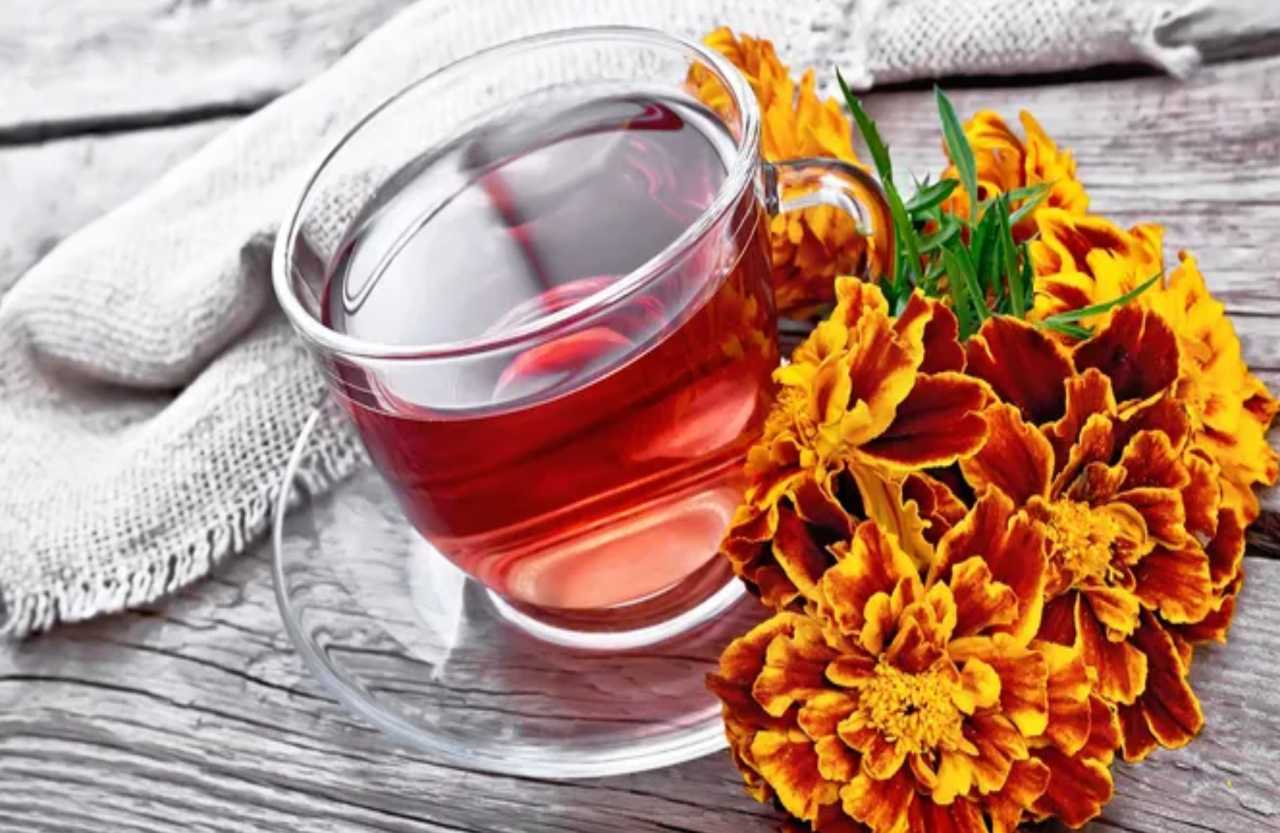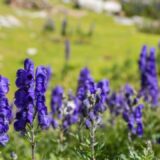Marigold: A Flowers With Many Uses and Health Benefits
Marigold, with its vibrant orange and yellow petals, is not just a feast for the eyes but also a treasure trove of health benefits. This humble flower, scientifically known as Tagetes, has been used for centuries in traditional medicine and culinary practices.  These beautiful and mildly scented flowers hold immense significance in the Hindu tradition. It’s intriguing to ponder whether our ancestors, long before the advent of modern science, were already aware of the remarkable health benefits that the humble marigold could offer.
These beautiful and mildly scented flowers hold immense significance in the Hindu tradition. It’s intriguing to ponder whether our ancestors, long before the advent of modern science, were already aware of the remarkable health benefits that the humble marigold could offer.
The use of marigold in Indian culture goes beyond its aesthetic appeal. These vibrant blooms are often used in religious rituals, festivals, and ceremonies. They symbolize purity, and auspiciousness, and are believed to ward off negative energies. Marigolds are often strung together to create colorful garlands, which are then draped around images of deities, homes, and temples.
Medicinal Properties of Marigold as per Ayurveda
Here are the medicinal properties of marigold as per Ayurveda
Taste (Rasa):
- Bitter (Tikta)
- Astringent (Kashaya)
The bitter taste in marigold indicates its ability to help balance excess sweetness or acidity in the body. Bitter tastes are often associated with detoxification and cleansing properties. The astringent taste suggests marigold’s potential to create a drying effect, making it beneficial for conditions involving excess moisture or mucus.
Qualities (Guna):
- Light for digestion (Laghu)
- Dry in nature (Ruksha)
Marigold’s “laghu” quality means it is easy for the body to digest, making it suitable for individuals with weak digestion. Its “ruksha” quality signifies its dry nature, which can be useful in drying up excessive fluids or mucus in the body.
Potency (Veerya):
- Cold (Sheeta)
Marigold’s cold potency makes it a cooling herb. In Ayurveda, cold herbs are often used to pacify excess heat in the body, particularly in conditions related to inflammation, acidity, and fever.
After Digestion Taste Conversion (Vipaka):
- Pungent (Katu)
Marigold undergoes a taste conversion after digestion, transforming from its original bitter and astringent tastes into a pungent taste. This pungent taste can have a stimulating effect on the body, aiding in digestion and potentially promoting metabolic activity.
Actions (Karma):
- Reduces vitiated Kapha & Pitta dosha (Kaphapitta Shāmaka)
Marigold is recognized for its ability to balance and alleviate imbalances in the Kapha and Pitta doshas. Kapha dosha is associated with qualities of heaviness, moisture, and mucus, while Pitta dosha is linked to qualities of heat and acidity.
Marigold’s properties help counteract these imbalances, making it valuable in Ayurvedic treatments for conditions related to these doshas.
Properties of Marigold
- Analgesic: Marigold has pain-relieving properties, making it useful for alleviating discomfort.
- Anti-Inflammatory: It possesses anti-inflammatory qualities, reducing inflammation and swelling.
- Antibacterial: Marigold exhibits antibacterial effects, helping combat bacterial infections.
- Anticancer: Some compounds in marigold are associated with potential anticancer properties.
- Antifungal: It can combat fungal infections, thanks to its antifungal attributes.
- Antiscrofulous: Marigold aids in the treatment of scrofula, a form of tuberculosis affecting the lymph nodes.
- Astringent: It has astringent properties, which can help tighten and tone tissues.
- Cholagogue: Marigold promotes the discharge of bile from the liver to aid digestion.
- Diaphoretic/Sudorific: It induces sweating, assisting the body in expelling toxins.
- Emmenagogue: Marigold can stimulate menstrual flow.
- Febrifuge: It helps reduce fever or fever-related symptoms.
Marigold Uses in Ayurveda
In the world of Ayurveda, the ancient Indian system of holistic medicine, marigold holds a special place as a therapeutic herb.
This vibrant and sun-kissed flower, known as “Genda” in Hindi, has been utilized for centuries to address various health concerns and promote overall well-being.
1.Menorrhagia/Raktapradar
For the condition known as Menorrhagia or Raktapradar (excessive menstrual bleeding), you can try the following remedy:
- Extract the fresh juice from marigold flowers.
- Take this juice in a dosage of 5-10 ml.
- This remedy may help in managing the symptoms of Menorrhagia by addressing excessive menstrual bleeding.
2. Stones in the Body
To address the issue of stones or calculi in the body, you can follow this remedy:
- Take 20 grams of marigold (genda) leaves.
- Boil the leaves in water to prepare a decoction.
- This decoction should be taken orally twice a day for a few days.
- The decoction of marigold leaves may aid in the treatment of stones or calculi.
3. Urinary Problems, Scanty Urination
Marigold leaves can be beneficial in addressing urinary problems, particularly scanty urination. Follow these steps:
- Take 10 grams of marigold leaves and grind them into a fine powder.
- Mix the powdered leaves with misri (crystalline sugar).
- Consume this mixture orally 2-3 times a day.
- This remedy may help in alleviating urinary issues such as scanty urination.
4. Piles (Bawaseer/Arsh)
For the management of piles, you can follow this remedy:
- Take 10 grams of marigold (Genda) leaves.
- Grind the leaves with some black pepper corns and water to create a paste.
- Filter the paste to obtain a liquid.
- Consume this liquid orally to address the issue of piles.
5. Respiratory Problems, Asthma, and Coughing
For these conditions, the black portion of dried marigold (genda) flowers is utilized.
- The dried black portion is powdered, and a dosage of 2-5 grams is taken with curd.
- This remedy is typically consumed 2-3 times a day to help alleviate respiratory issues, including asthma and coughing.
6. Anal Prolapse
For the condition known as Gudbransh or anal prolapse, the following remedy can be employed:
- Take 10 grams of marigold (Genda) leaves and ensure they are clean.
- Grind the leaves with 20 ml of water to form a paste.
- Filter the paste to obtain a liquid.
- Consume this liquid twice a day to address the issue of anal prolapse.
7. Erectile Dysfunction
For the management of erectile dysfunction, you can try the following remedy:
- Prepare a mixture by combining the powder of marigold (genda) seeds with misri (crystalline sugar).
- Take this mixture with milk twice a day.
- The recommended dosage is 2-5 grams.
- This remedy may help address erectile dysfunction issues.
8. Ear Pain
For the relief of ear pain, you can follow this natural remedy:
- Take fresh marigold (Genda) leaves and ensure they are clean by washing them under running water to remove any dirt, soil, or impurities.
- Extract the fresh juice from these leaves.
- Place 2 drops of the fresh marigold leaf juice in the affected ear.
Note: It’s important to note that while natural remedies like marigold seeds may offer some benefits.
It’s advisable to consult with a healthcare professional for proper diagnosis and guidance, especially for the treatment of erectile dysfunction.
20 Marigold Uses in Medicine
Marigold finds extensive use in medicine for its remarkable healing properties, aiding in the treatment of skin conditions, wounds, and inflammation, making it a valuable botanical resource in traditional and alternative healthcare. below are some of its benefits.
1. Healing Skin Conditions: Marigold tincture is a potent remedy for healing various skin issues, including bruises, cuts, burns, irritated skin, and wounds.
It supports the growth of new cells, tissues, collagen proteins, and blood vessels, aiding in wound healing and improving blood circulation in affected areas.
2. Antifungal Properties: Marigold’s antifungal properties make it effective in treating conditions like candida albicans, athlete’s foot, and ringworm.
3. Weight Loss Support: Marigold, being rich in flavonoids and vitamin C, has no fat content, making it a beneficial addition to weight loss diets.
4. Skin Care: The antibacterial and anti-inflammatory properties of marigold make it an excellent face wash for dry, irritated, and acne-prone skin.
5. Allergy and Inflammation Relief: Marigold’s anti-inflammatory properties are used in the treatment of allergic reactions, insect bites, and dermatitis.
6. Oral Health: Calendula tinctures are used to treat sore or infected gums. Calendula tea can also be used as a gargle for soothing sore throats.
7. Eye Health: Marigold is rich in antioxidants like lutein, zeaxanthin, and lycopene, making it beneficial for treating conjunctivitis and reducing eye inflammation and redness. It may help prevent eye diseases and blindness.
8. Menstrual Cramp Relief: Marigold is believed to have some anti-spasmodic action, potentially relieving menstrual cramps.
9. Digestive Aid: Marigold infusion and tea aid digestion and can help with mouth pain, stomach ulcers, colitis, and menopausal symptoms. They stimulate the lymphatic system, reducing swelling.
10. Vaginal and GI Health: Marigold petals are used in sitz baths for vaginal and bladder infections, healing post-childbirth stitches, and treating hemorrhoids.
Marigold tea soothes gastrointestinal irritations, diarrhea, cramps, colitis, and IBS. It contains calendic acid, which helps alleviate stomachaches and indigestion.
11. Detoxification: Marigold tea supports body detoxification and stimulates the lymphatic system to eliminate toxins, reduce inflammation, and aid liver detoxification.
12. Varicose Vein Treatment: Compresses made from marigold blossoms are used to treat varicose veins.
13. Immune System Support: Marigold contains high-molecular-weight polysaccharides that stimulate the immune system, potentially offering therapeutic activity against HIV.
14. Antibiotic Properties: Marigold flowers can be used to make infusions, tinctures, and ointments with antibiotic properties, effective for skin rashes, bed sores, and diaper rash.
15. Oily Skin and Acne Treatment: Marigold infusions in water can naturally address oily skin and help cure acne and skin blemishes.
16. Prostate Health and Cancer Prevention: Marigold tea, rich in lycopene, is essential for prostate health and cancer prevention. It controls the spread and growth of cancer cells, making it beneficial for various cancer types.
17. Cold and Flu Remedy: Marigold tea can be used to alleviate cold, flu, and associated cough symptoms.
18. Culinary Use: Marigold leaves and flowers can be incorporated into salads, cakes, pies, and deep-fried dishes, adding both flavor and a touch of color.
19. Skin Conditions and Corns: Marigold infusion is beneficial in healing skin conditions like scabies, corns, calluses, and warts.
20. Antioxidant-Rich: Marigold’s high antioxidant content helps combat free radicals, reducing the risk of heart ailments, and cancers, protecting eyes from degeneration, and promoting overall health.
Certainly! Here are the potential risks and precautions associated with marigolds:
Possible Side Effects of Marigolds
Collecting and drying marigolds during the summer can be a delightful and beneficial activity for many. However, it’s essential to be aware of potential risks and precautions when using marigold products:
1. Individual Intolerance: Marigold products should be avoided by individuals who have an individual intolerance or allergies to the plant. Allergic reactions can range from mild skin irritations to more severe symptoms.
2. Pregnant and Breastfeeding Women: It is advisable for pregnant women to refrain from using folk remedies based on marigolds. Scientific evidence regarding the effects of marigolds on the fetus is limited, so caution is warranted during pregnancy and breastfeeding.
3. Children Under Two Years of Age: Marigold infusions, teas, and decoctions are generally not recommended for children under two years of age. Young children may have sensitive digestive systems, and it’s best to consult with a healthcare professional before introducing marigold-based remedies.
4. Stomach Irritation: Ingesting marigold in large doses can potentially irritate the mucous membranes of the stomach. It’s essential to follow recommended dosage guidelines and consult with a healthcare provider if you experience any adverse reactions.
Note: While marigolds offer numerous benefits, it’s crucial to exercise caution and seek guidance from healthcare professionals, especially for individuals with specific health conditions or sensitivities.
Frequently asked questions (FAQs) about marigolds
Q1. What is the use of marigolds in India?
A1. Marigolds are commonly used in India for various purposes, including religious and cultural ceremonies, decorations, and traditional medicine due to their vibrant colors and cultural significance.
Q2. What are the benefits of marigolds at home?
A2. Marigolds at home can serve as natural pest repellents in gardens, add colorful aesthetics to landscapes, and even be used for making herbal remedies or homemade skincare products.
Q3. What are two uses of marigold leaves?
A3. Marigold leaves can be used in traditional medicine for their potential anti-inflammatory properties and are sometimes used in herbal teas or poultices to soothe skin irritations.
Q4. What is marigold and its benefits?
A4. Marigold is a flowering plant known for its vibrant flowers. Its benefits include wound healing, skin care, potential anti-inflammatory effects, and support for eye health, among others.
Q5. Can you eat marigolds?
A5. Yes, marigold petals are edible and can be used to garnish salads, add color to dishes, or infuse flavor into foods. However, some varieties may have a bitter taste.
Q6. Is marigold good for skin?
A6. Yes, marigold is beneficial for the skin due to its anti-inflammatory, antibacterial, and wound-healing properties. It is used in skincare products to soothe and nourish the skin.
Q7. What are the special features of marigolds?
A7. Marigolds are known for their vibrant and varied colors, ranging from golden yellow to deep orange. They have a mild, pleasant fragrance and are often associated with cultural and religious symbolism.
Q8. How do you use marigolds for hair?
A8. Marigold can be infused into hair rinses or used in hair masks to promote hair health and shine. It may also help reduce dandruff and improve scalp health.
Q9. Which marigold is used for tea?
A9. Calendula marigold (Calendula officinalis) is commonly used for making herbal teas due to its potential health benefits.
Q10. How is marigold used in rituals?
A10. Marigolds are used in religious rituals and ceremonies for their symbolic significance. They are often strung into garlands and used to decorate idols, homes, and temples.
Q11. Which flower is best for hair?
A11. Marigold is considered one of the flowers that can benefit hair health, promoting shine and potentially reducing dandruff when used in hair care routines.
Q12. Can we use marigold flower on the face?
A12. Yes, marigold flower extracts or infusions can be used on the face in skincare routines. They are known for their skin-soothing and anti-inflammatory properties.
Q13. Is marigold good for hair growth?
A13. Marigold may support hair health and possibly aid in hair growth when used in hair care remedies due to its nourishing properties for the scalp and hair follicles.


























